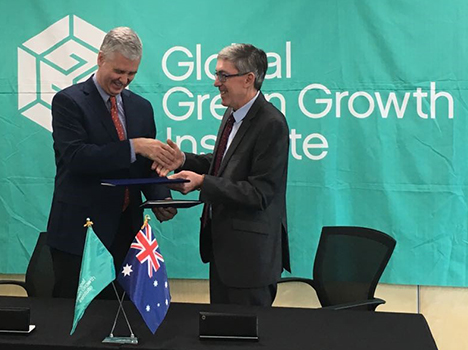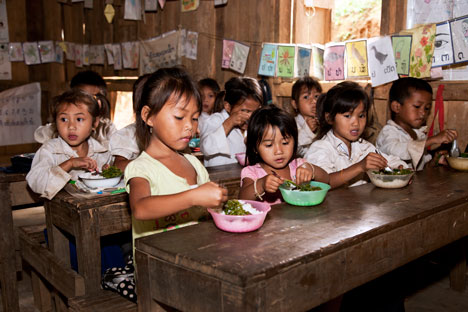Health, education and environment funds
Multilateral sectoral funds (sectoral funds) are a key aspect of Australia's Partnerships for Recovery strategy in response to the impacts of COVID-19, as they provide a single point through which pooled funding from multiple sources can be disbursed to achieve outcomes that would otherwise be more challenging to realise. Sectoral funds also allow access to levels of expertise and development resources not usually available to individual countries. Australia provides funding to a number of sectoral funds that are working to improve outcomes in health and education, sustainable development and innovative financing in low income countries. These include Gavi, the Vaccine Alliance; the Global Fund to Fight Aids, Tuberculosis and Malaria; the Global Partnership for Education; the Global Environment Facility; the Multilateral Fund for the Implementation of the Montreal Protocol; the Green Climate Fund; and, the Global Partnership for Output-Based Aid.
Gavi, the Vaccine Alliance
Gavi, the Vaccine Alliance helps lower-income countries build up their routine immunisation and introduce new vaccines. DFAT has a long-standing partnership with Gavi, you can find more information on the global health initiatives page.
Global Fund
The Global Fund to Fight AIDS, Tuberculosis and Malaria is an international financing partnership that supports large-scale prevention, treatment and care programs and strengthens health systems in developing countries. DFAT has a long-standing partnership with the Global Fund, you can find more information on the global health initiatives page.
Global Partnership for Education
The Global Partnership for Education (GPE) is a multi-stakeholder partnership of bilateral and multilateral donors, developing country partners, and representatives from civil society and the private sector. GPE's goal is to provide inclusive and equitable quality education and lifelong learning opportunities for all.
GPE's objectives are strongly aligned with Australia's aid priorities and our Partnerships for Recovery strategy in response to COVID-19:
- improving the resilience of vulnerable education systems in response to school closures
- promoting girls' education
- providing access to education to the poorest and most marginalised children including in fragile and conflict affected states; and
- focusing on results in teaching and learning.
Australia has committed a total of $570 million to GPE since 2007. Australia's support to GPE complements our bilateral education programs in the region and extends our reach in the education sector to a global scale. Australia is an active member of GPE's board.
In 2018-20, GPE provided $693.8 in education grants to support equal access to quality education in the Indo-Pacific, including $144.5 million to support education sectors in our region mitigate the sectoral impacts of COVID-19.
Since 2002, GPE (and its forerunner, the Education for All Fast Track Initiative) has:
- supported 160 million more children to be in school in 70 partner countries
- doubled the number of girls in school in partner countries
- provided 67 million more children with access to quality teachers
Global Environment Facility (GEF)
The Global Environment Facility (GEF) is an international partnership of 183 countries, international institutions, civil society and the private sector, which addresses global environmental issues. It works with partners to improve agricultural productivity, sustainable fisheries and water resource management for poor communities. It also engages in environmental activities including biodiversity, land regeneration, protection of international waters, climate change mitigation and adaptation, and management of persistent organic pollutants and the ozone layer.
Australia contributed $93 million to the GEF (2014-18) to provide a range of grants to the Indo-Pacific region. As a member on the GEF Council, Australia is actively engaged in the governance of the GEF.
Green Climate Fund
The Green Climate Fund is a US$10.3 billion fund that aims to be the world's leading multilateral funding for addressing climate change in developing countries. Australia has pledged $200 million over four years to the Green Climate Fund (GCF) to support developing countries to grow their economies in a sustainable way and help them adapt to climate change. The GCF will leverage private sector investment and support a range of emission reduction and adaptation projects with broader economic and environmental benefits. Australia is an active member of the GCF Board and uses its seat to advocate the interests of our region, and to promote effective governance. Australia was Co-chair of the GCF Board throughout 2016 and 2017.
DFAT blog has more information on Australia's role in the GCF.
More information on how Australia is working with other countries to share direct, practical approaches to tackling climate change.
Global Partnership on Output-Based Aid
;The Global Partnership on Output-Based Aid (GPOBA) funds, designs, demonstrates, and documents output-based aid (OBA) approaches. OBA is a results-based and innovative financing instrument designed to improve delivery of basic infrastructure and social services for the poor (e.g water, telecommunications, micro-finance). OBA projects are commonly delivered by private firms, with donors providing performance-linked subsidies.
Working with GPOBA enhances Australia's expertise in the selection, design and implementation of OBA activities, to look at ways in which innovative financing of projects can deliver stronger and more predictable results
Global Green Growth Institute
The Global Green Growth Institute (GGGI) is an international organisation that supports strong, inclusive and sustainable growth in developing countries and emerging economies. The GGGI works closely with developing country governments by providing advisory services to support the delivery of green growth strategies, build institutional capacity and develop projects that incentivise and leverage public and private financing. The GGGI currently delivers programs in 26 partner countries, providing technical assistance, policy planning and helping to develop green investment projects. The GGGI also facilitates knowledge sharing on sustainable growth between its member countries and partner organisations.
Australia is one of six founding core contributors to the GGGI, which was established in 2012. Australia contributed US$20 million ($28.3 million) to the GGGI from 2012-2016. In April 2017, Australia re-committed to fund US$15 million to the GGGI for 2017-19. The GGGI has delivered strong outcomes in the Indo-Pacific region, and is expected to direct close to 40 per cent of GGGI funding to the region in 2017-18.


